Tokyo Tech conducted its Summer Program from June 5 to August 9, 2018. Aimed to provide students from top-ranking universities, mainly in the U.S. and Europe, with opportunities to conduct short-term research projects in Tokyo Tech faculty labs, the Summer Program welcomed a total of 34 students in 2018.
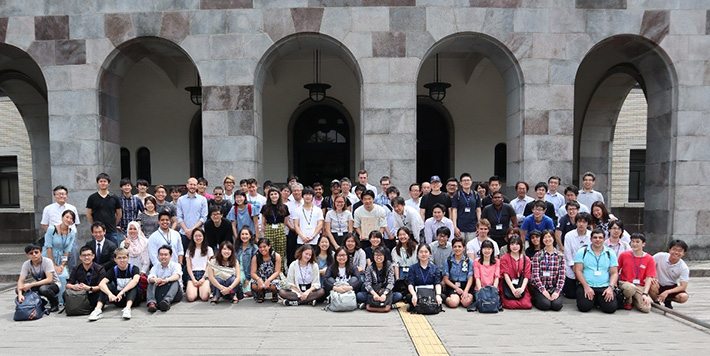
With new lab mates in front of Main Building at Ookayama Campus
Comments from host faculty members and Summer Program participants
Experience at Kitamoto Laboratory
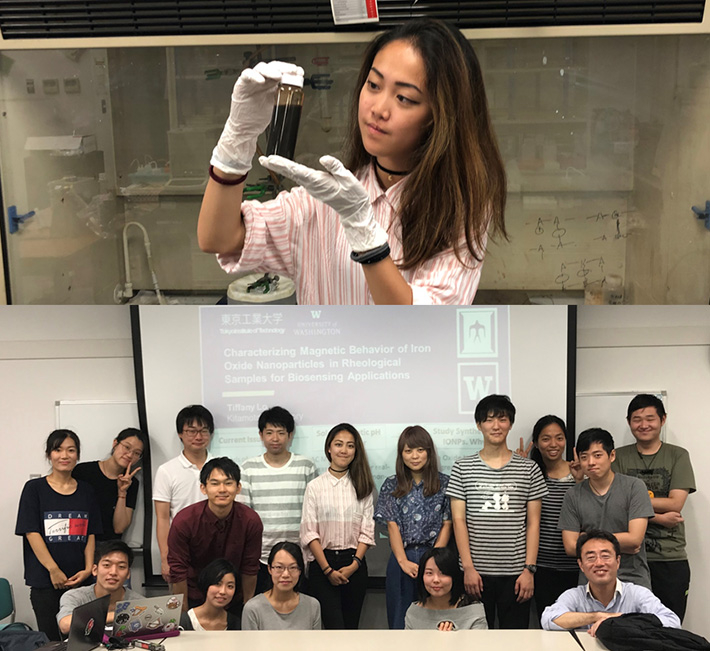
Above: Lo focused in the lab
Below: Lo with lab mates and Kitamoto (front row, far right)
Yoshitaka Kitamoto
Professor, Department of Materials Science and Engineering, School of Materials and Chemical Technology
We are studying the use of magnetic fluids and gels in biomedical techniques, such as biosensing. Tiffany Lo studied syntheses of magnetic nanoparticles and gels for this purpose and investigated their properties. She enjoyed experiments and discussions in our group, and the experiences seemed new and impressive to her. At our welcome party, she enjoyed cooking dumplings with our laboratory members. At our seminar, she made an excellent presentation that was comparable to those by our graduate students. I am very proud that she wants to continue a study on magnetic nanoparticles in her bachelor's research and that she expressed interest in returning to Tokyo Tech for graduate school. I hope the force of ferrite magnets, a Tokyo Tech invention, will attract her to rejoin our lab. Her work provided our lab's members with a stimulating two months.
Tiffany Lo
Undergraduate, University of Washington
During my time in Japan, I had the fantastic opportunity to participate in Professor Yoshitaka Kitamoto's research group, which specializes in the synthesis and study of iron oxide nanoparticles and their biosensing capabilities. Recently, nanoparticles have been heavily considered for biomedical applications. During my time in Kitamoto's group, I studied the syntheses of magnetic particles, their magnetic behavior in rheological samples, and their pH or protein sensing capabilities. The support, encouragement, and wisdom I found in Kitamoto's lab are things I will always appreciate and remember. My lab mates and professor always challenged me to do my best and think critically, pushing me to always ask questions about the results I obtained. With the help of weekly seminars, I was able to understand the implications of our research while bonding with other Japanese students.
Experience at Fushinobu Laboratory
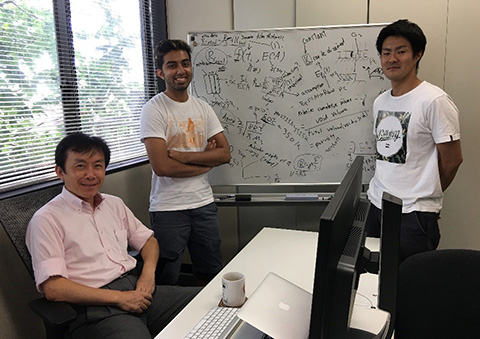
(from left) Fushinobu, Raje, and mentor Syunsuke Kawasaki
Kazuyoshi Fushinobu
Associate Professor, Department of Mechanical Engineering, School of Engineering
We specialize in thermal engineering in the Department of Mechanical Engineering, and the polymer electrolyte fuel cell (PEFC) is one of our current research topics. Aamod Raje's mentor student at Tokyo Tech showed interesting experimental results in his bachelor's thesis work last year, but we did not have time to develop an appropriate theoretical model to explain the results. Aamod's request to conduct fuel cell research at our lab was timely, and I asked him to work on it during his 10-week stay. Although he is still a junior student, he did a great job due to his high academic potential, abounding curiosity, and experience in a research project at Georgia Tech. By closely working with his mentor, Aamod pointed out the issues in the original modeling scheme. After a discussion on reconsidering the model, he did an extensive paper search to show the critical information to develop a new model. Aamod's gentle and friendly nature enabled him to adapt quickly to the lab, and I feel that his stay was a wonderful experience for all of us.
Aamod Raje
Undergraduate, Georgia Institute of Technology
I had a wonderful time at Tokyo Tech. Everyone in my lab was extremely helpful with not only my research, but my activities outside of lab as well. In the lab, I investigated the topic of the cathode catalyst layer (CCL) of PEFCs. Within the CCL, there are platinum particles that are one of the most expensive parts of a fuel cell. Reducing this cost and understanding how the CCL works is a topic of high interest with fuel cells. The objective I had was to separate the total resistance oxygen molecules face while travelling through the CCL into macro and local resistances. I was able to use my electrical engineering background from Georgia Tech and implement MATLAB for the various calculations required. At the end, I was able to reach a conclusive result and put together an attractive poster through the help of my lab mates.
Outside the lab, living in the Tokyo metropolis was one of the greatest experiences I have ever had. I was always interested in Japan and traveling here. Every weekend, I was able to go somewhere new and exciting; so much so, that every time I went out to one place, I would end up with two more places to see. I was also able to improve my Japanese, although my lab mates were able to help me with anything in English.
Experience at Yoshida Laboratory
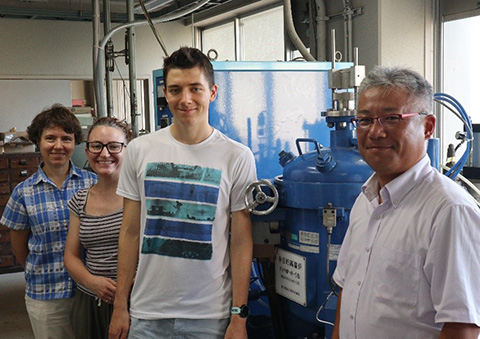
(from right) Yoshida, Emory, Yoshida lab faculty members
Dr. Jelena Maletaskic and Dr. Anna Gubarevich
Katsumi Yoshida
Associate Professor, Department of Materials Science and Engineering, School of Materials and Chemical Technology (Laboratory for Advanced Nuclear Energy, Institute of Innovative Research)
Our laboratory has been developing high performance, severe-environment-resistant ceramics through exposure to severe environments, such as temperatures above 1,000 degrees Celsius, high thermal gradients, corrosive and oxidizing atmosphere, radiation, and particle irradiation. Our ceramics are intended for use in nuclear and fusion applications, environment and energy fields, and aerospace industries. We focus on alumina ceramics and typical engineering ceramics. Through his diligent research on fabrication using plate-like alumina particles of highly microstructure-controlled alumina ceramics that mimic sea shell structures and their mechanical properties, our Summer Program student, Joshua Emory, has achieved remarkable results and findings in spite of the short 10-week period. Due to this time limitation, he unfortunately could not identify the crystalline phases of his samples, but I hope he was able to learn ceramic processing, and how to improve mechanical properties of ceramics using microstructure control. He was an active member of our laboratory, attending seminars, conducting research as a team player, and communicating with other laboratory members.
Joshua Emory
Undergraduate, University of Wisconsin-Madison
Having never left North America before, I found the Tokyo Tech Summer Program to be filled with new experiences — each day was exciting and fun. During the program, I spent my research time mimicking the microstructure of a sea shell for use in engineering ceramics. Having had little experience with many of the topics and methods, I found lab work to be challenging, but my lab's members and professor made it comfortable from day one by hosting me a welcome party.
Throughout the summer, the atmosphere in lab motivated me to challenge myself and work hard. In addition to the time spent in lab, I not only learned about Japanese culture, but about cultures from other countries as well. I became good friends with many of my dorm mates through nights of exploring the nooks and crannies of the city. On the last day, I got to see Tokyo from the top of a skyscraper; it looked intimidatingly big and complex, yet I felt at home.
Experience at Akama Laboratory
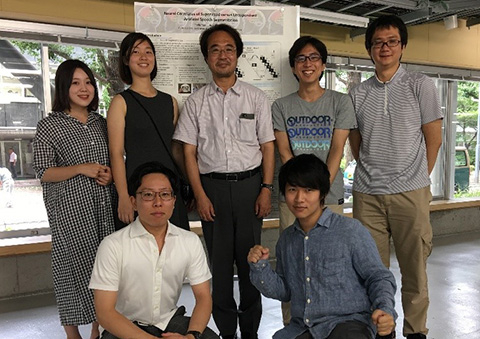
Yuan and Akama (back row, second and third from left)
with host lab members during final poster presentation
Hiroyuki Akama
Associate Professor, Department of Life Science and Technology, School of Life Science and Technology
The Akama Laboratory is conducting research on language processing in the human brain using the technique of functional magnetic resonance imaging (fMRI). In the study led with Stella Yuan, we created continuous sound streams of artificial languages based on controlled transitional probabilities between adjacent words and prompted a participant in the fMRI scanner to perform the task of extracting these words in the context of supervised and unsupervised learning. This study aims at exploring the neural basis of probabilistic sequential learning and may play an important role in the future of artificial intelligence.
Stella is studying epigenomics at Carnegie Mellon University, but she has a strong interest in brain imaging. With a broadened knowledge of computational neuroscience and programing skills, she was able to easily adapt herself to the activity of our laboratory. Some MATLAB or R scripts she wrote through the activity of the summer school will continue to be valuable resources for our research. Stella is a polyglot who can fluently speak English, Chinese, French (which we used when I was tired of speaking English), and Japanese with native acute sensitivity to sounds. She brought to our research paradigm a new viewpoint, which is probabilistic learning of pitch and intonation patterns. In the background of this contribution, there might be her personal history: she has a profound knowledge of Japanese pop culture and is fond of listening to Japanese music, including anime songs. Thus, it was quite natural that the Japanese students in our laboratory, who are all authorities on this field, were able to deepen friendships with Stella through Akihabara culture.
Yixin (Stella) Yuan
Undergraduate, Carnegie Mellon University
My stay at Tokyo Tech was a challenging yet inspiring and fruitful one. I learned a large variety of fundamental knowledge and technical data-analysis skills with the help and support of my academic supervisor. It was the first time that I had ever come into such close contact with an fMRI machine, and it was a new and exciting experience for me to preprocess and analyze fresh brain data derived from such scanning sessions. Not only do I treasure the skills and methods learned for this amazing field of study, I also found the supportive and open lab environment to be invaluable.
I feel extremely grateful for being offered both detailed supervision on the technical side and the freedom to explore and connect different pieces of the puzzle when it comes to data integration and interpretation. I'm very thankful for my supervisor's openness and respectfulness toward my work and countless questions on the way. In addition, the lab members were a true pleasure to be around.
I also took the initiative to join the badminton club at Tokyo Tech, which taught me the importance of commitment and self-discipline. It was a memorable experience to plunge into the intense trainings and feel Japan's sports culture. I treasure my interactions with all the people I met throughout the program, and I definitely feel that with this international experience, I'm one step closer to personal growth and development.
Experiences outside the labs
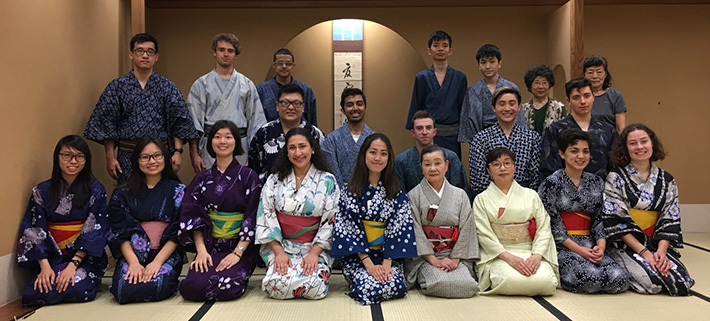
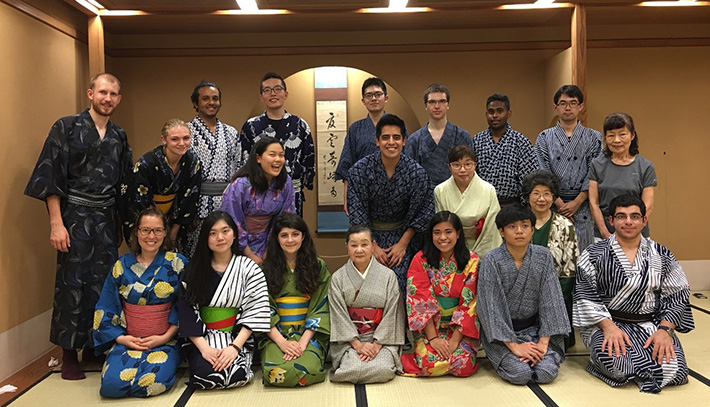
Summer Program participants in traditional Japanese dress for tea ceremony experience
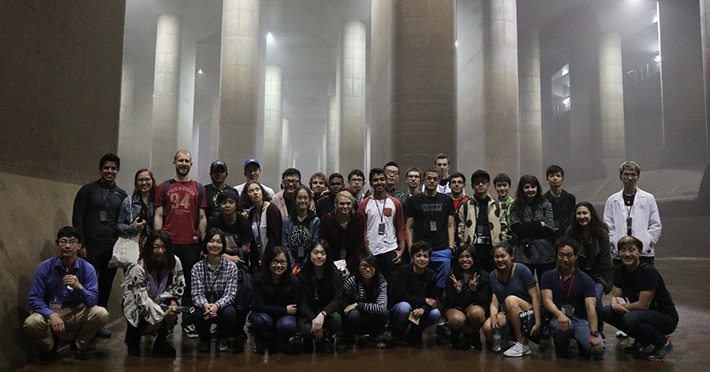
Site visit to Tokyo Metropolitan Area Outer Underground Discharge Channel
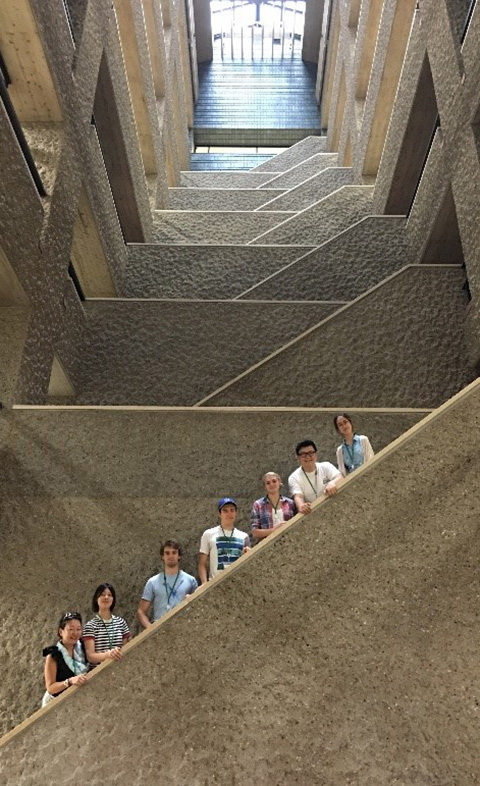
Visit to National Diet Library
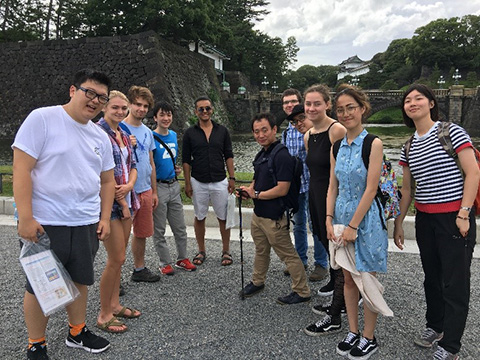
Outside Imperial Palace
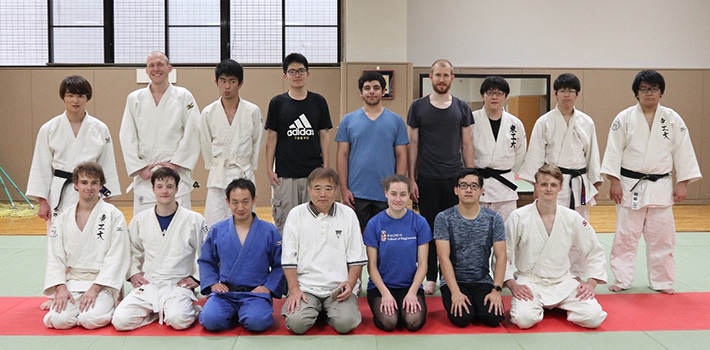 Judo experience
Judo experience
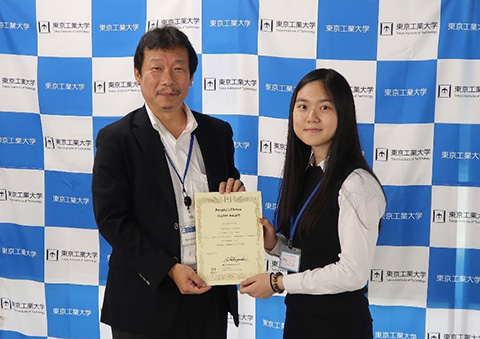
Vice President for International Affairs Hidetoshi Sekiguchi
(left) presenting People's Choice Poster Award on final day to University College London's CHEONG, Sherry Sau Mun
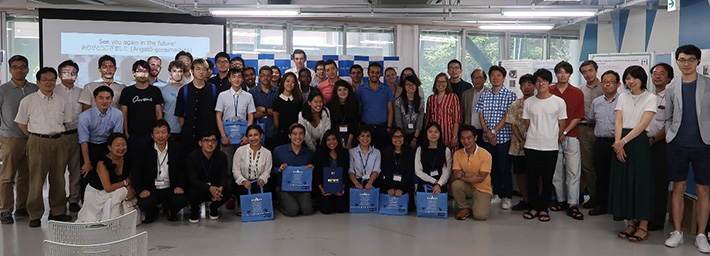
Participants, host faculty members, and lab mates at closing ceremony
. Any information published on this site will be valid in relation to Science Tokyo.












 Judo experience
Judo experience

